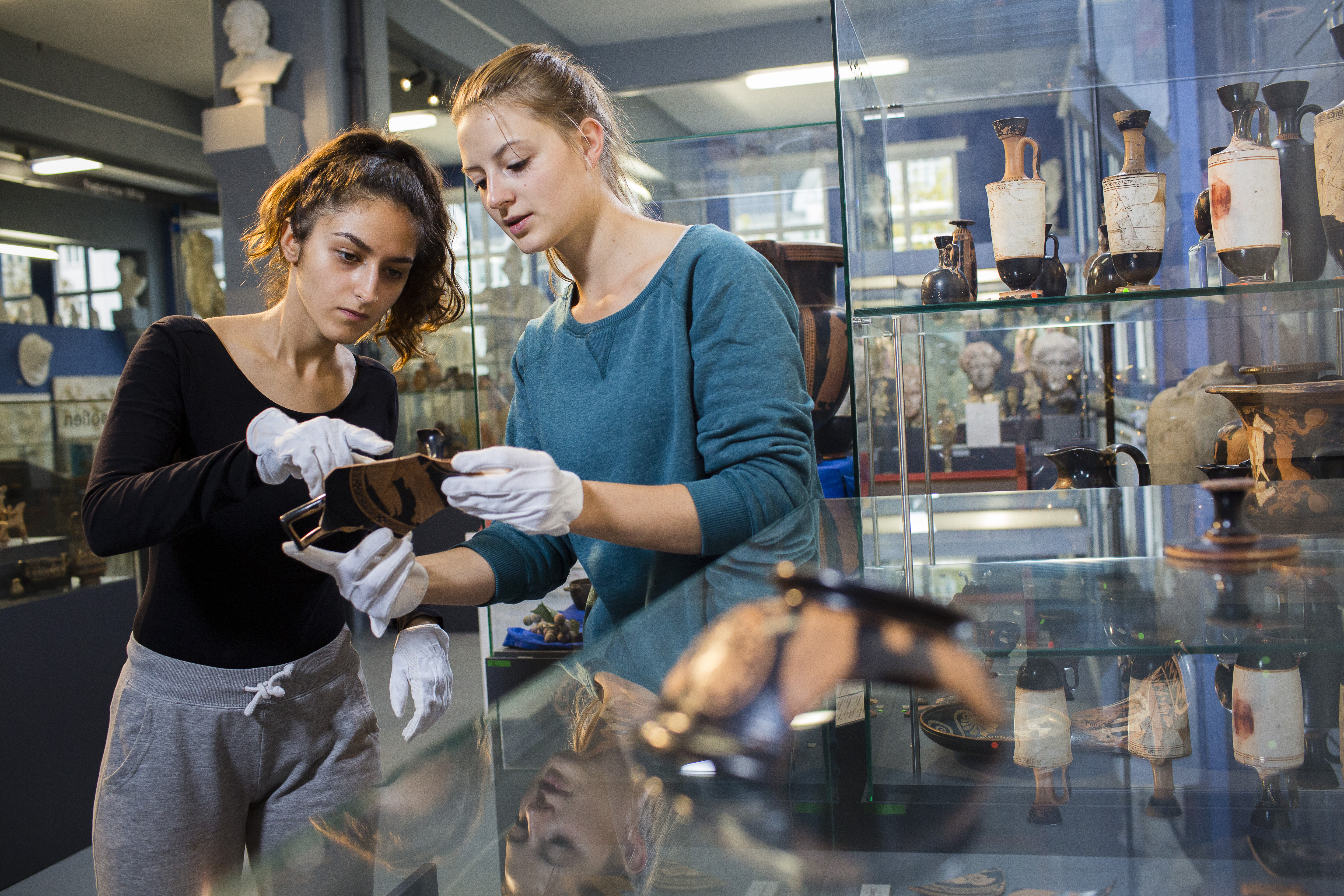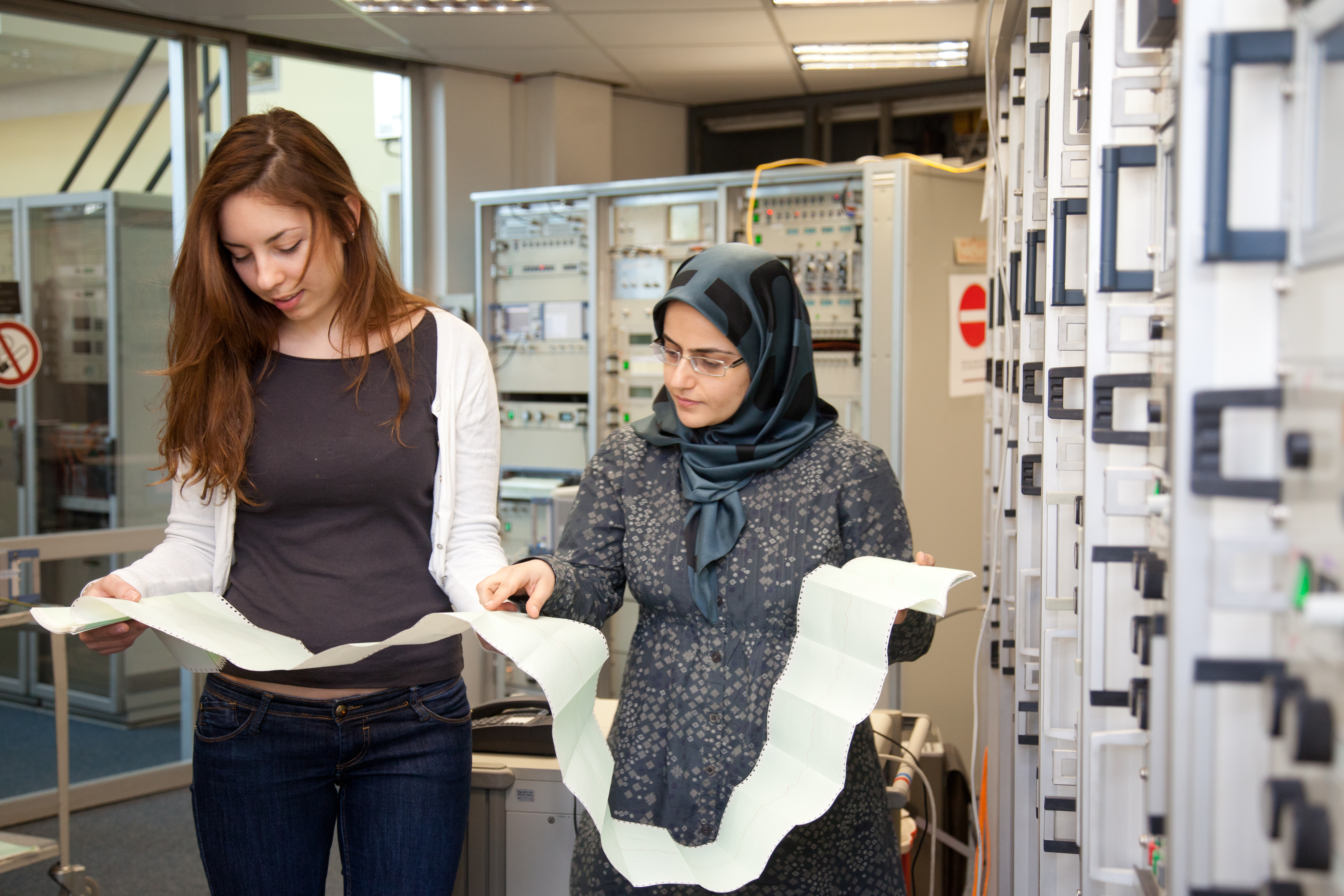DFG promotes equal opportunity in the German research sector

Women archaeology researchers examine the collection of ancient fragments from Troy in the Collection of Ancient Art at Friedrich Schiller University Jena
© DAAD/Jan Zappner
To mark International Women's Day on 8 March, we are presenting measures taken by Germany's largest research funding organisation to further gender equality in research
Despite the considerable progress achieved by feminist movements in recent decades, women continue to be under-represented in various social areas all over the world. This is also true for the research sector: according to the latest data collected by UNESCO, the proportion of women in research is merely 28.8%.
The study also shows regional and national manifestations of inequality around the world and has revealed that the low proportion of women in research is not necessarily linked to high social inequality and slower economic development. In the regional comparison, the proportion of women in research and development in Latin America was 45.5% compared with just 32.3% in Western Europe and North America.
Germany falls within the global average since, despite the well-established German research system, equal opportunities for men and women still constitute a challenge. Just 28% of a total of 401,000 staff members at the country's 1,000 or so public research institutions are female.
This proportion falls even further if we consider more senior academic career grades. According to DFG surveys, over half (50.6%) of degrees awarded in 2016 went to women. However, the proportion of women among professors amounted to just 23.9% in total – and among the highest salaried professors at C4/W3 grade, this figure was only 11.6%. These statistics show that many women do not stay in the research system.
In the DFG’s view, this kind of imbalance represents a loss for research, as untapped talent and potential that could have contributed to excellence in research disappears from the German research landscape. The DFG is therefore taking steps to address the issue of equal opportunity. In 2002, the General Assembly resolved to record gender equality in research as a defined objective in Paragraph 1 of the DFG’s statutes. Since then, a wide range of efforts has been made to integrate this requirement in both funding and within internal structures.
The reasons why women are under-represented in research are complex, but one frequent cause is the difficulty associated with balancing family and career. In view of this fact, the DFG has endeavoured to enable universal access, in terms of gender-specific factors, to all academic career grades. This encompasses measures such as consideration of parental leave or absences and associated interruptions in publications when assessing applicants’ academic qualifications.
“Our aim in promoting equal opportunity is to achieve equality between male and female scientists in research and contribute towards the compatibility of research career paths and family life. This should also increase the attractiveness of the research location – in particular with regard to early career researchers,” explained Dr. Ines Medved, Administrative Officer of the Equal Opportunities, Research Integrity and Cross-Programme Development division at DFG Head Office in Bonn.
To move closer to these goals, as part of its funding programmes, the DFG has also introduced various measures to support male and female researchers – for example, allowing additional funds to be applied for to recruit part-time staff – including in project management roles – if researchers are on parental leave.

Women researchers from the MPI in Effelsberg
© DAAD/Volker Lannert
Since 2006, the DFG, together with other research institutions, has been involved in the Gender Equality in Research Initiative (Offensive für Chancengleichheit von Wissenschaftlerinnen und Wissenschaftlern) aimed at supporting women in research. Two years later, the DFG’s member organisations agreed a voluntary commitment to Research-Oriented Standards on Gender Equality to increase the participation of women in research at all career levels in the German research system and establish gender equality as a matter of concern at management level. These contents were expanded and updated in 2017.
According to Medved, these efforts have already yielded measurable results: “Monitoring the implementation and application of these standards in a study showed that structural and cultural changes have already been achieved to improve equality. Together with other initiatives and programmes, this has placed greater emphasis on the issue of equal opportunity in the research system.”
In 2018, the institutions involved in the initiative also agreed to submit concise qualitative reports on different key topics every two years and, without competition, to engage in mutual discussion of successful and less successful equal opportunity measures.
With regard to the DFG's internal structures, a department to promote equal opportunity has been created at Head Office. One particular priority is continuously increasing the proportion of women in statutory bodies and review processes. The DFG has already more than fulfilled the target of at least 30% women researchers in its statutory bodies as decided in 2017- last year, 45% of members of both the Senate and the Joint Committee were women. According to Dr. Medved, this increased involvement of women researchers in decision-making processes already represents significant progress that is “leading to greater equity, opening up more diverse prospects and, at the same time, helping to prevent one-sided decision-making processes”.
Another important focus is increasing the number of female applicants. In the period from 2014 to 2017, a slight increase (13.5% to 19.1%) was recorded in research grant applications from women scientists; while in coordinated programmes, this proportion rose from 22.2% to 25.6%.
Since 2017, the DFG has also been pursuing a qualitative equality concept involving an examination of its funding programmes and instruments to identify any structural obstacles and promote the equality of men and women by means of suitable measures. Funding activities will also be reviewed from the perspectives of career and staff development and achieving a balance between career and partner or family. Initial concrete measures have already been taken: for example, for the Emmy Noether Programme the statutory bodies approved the abolition of the 12-month required residency abroad and the introduction of an earmarked family allowance of up to €6,000 per year for travel to conferences and research visits.
Over the next few years, the funding organisation will examine diversity in the research sector with the aim of expanding the diversity of prospects in research and thus further improving research quality. The issues to be addressed include complaints of sexual harassment in connection with DFG-funded applications or projects, disability or chronic illness, ethnic and social origin, religion, migration background and sexual orientation. “Funding organisations’ decision-making processes can also be subject to this kind of subliminal prejudice – even in a context such as research which is, by definition, knowledge-driven and places value on objectifiable results,” commented Medved.
By continuously improving and observing these initiatives and through discussions with other research organisations, the DFG aims to continue its efforts towards equal opportunity in research. At an international level, it is currently involved in the Gender Working Group of the Global Research Council, a worldwide group of research funding organisations that is scheduled to meet in May in São Paulo.
Further Information
- Women in Science - a UNESCO Stud
- Equal Opportunity Measures in Individual Funding Programme
- Research-Oriented Standards on Gender Equalit
- Study: Die Forschungsorientierten Gleichstellungsstandards der DFG: Umsetzung und Wirkungsweisen (Research-Oriented Standards on Gender Equality – Implementation and Impact – only in German